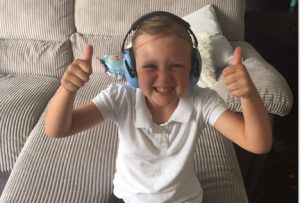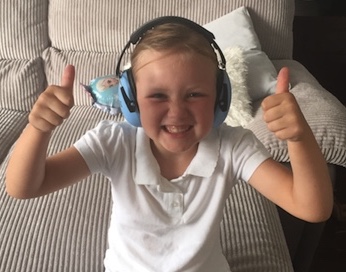Overcoming My Moments of Jealousy
/by Helen Needham There are fleeting moments when I get jealous. When a post pops into my Facebook feed or someone tells me of a great thing they’ve done as a family. In these moments, I feel like we are missing out as a result of my son’s autism, and I struggle with the loss of things that we can’t do/struggle with/have never done.
There are fleeting moments when I get jealous. When a post pops into my Facebook feed or someone tells me of a great thing they’ve done as a family. In these moments, I feel like we are missing out as a result of my son’s autism, and I struggle with the loss of things that we can’t do/struggle with/have never done.
It is not something that I am proud of, as we are happy as a family and have so much to be thankful for. It is just that when I am reminded of some of the struggles that we face, I need a little time to reset myself. Time to get past the thoughts of what we are missing out on, and time to remember the moments we do have and the achievements we have made.
Parties, Friends and Playdates
When I see children with friends or pictures of birthday parties or hear of their playdates, I am reminded of the things my son doesn’t get to experience. I feel the loneliness, but he does not. He struggles with social interaction and his need to control the world prevents him from making friends. He misses the friends he had when he was younger, but in a crowd of people it is his Dad that he turns to for company.
When I feel the loss of friendship, I remember his amazing bond with his Dad and realise that he has a great friend already.
Academic Progress
When I see children getting awards, I am reminded of the fact that he has never received an award or even been designated pupil of the week. I feel his lack of progress compared to his peers but he does not. He struggles in the classroom, requires a lot of support to get through the day and took years just overcome his resistance to writing. He is progressing slower than his peers and is not fulfilling his academic potential, but he loves searching for answers to questions that most children don’t even think about.
When I feel his slow academic progress, I remember his inquisitive mind and realise that he doesn’t need awards or validation from others to make him feel successful.
Participation in Sports and Activities
When I see children’s sporting achievements or photos of the activities that they have taken part in, I am reminded of the sports lessons that did not work out and the things we can’t do. I feel him missing out but he does not. He struggles with team sports and any regular lessons, so our weekends are typically spent at home. Given the choice he would rather run around pretending to be a superhero or playing with his Lego.
When I feel his missing out on sports and other activities, I remember the skills he has mastered to create some amazing Lego creations and his training plan to become a ninja. I realise that he doesn’t need to play a sport or learn a new skill to feel accomplished.
Days Out, Holidays and Special Occasions
When I see families enjoying fun times together, I am reminded of the days spent on edge as I work at 200% to help my son get through the day and avoid a meltdown. I feel the struggles that we go through but he does not. We need to plan our trips carefully and special occasions are often tough, but as a family we are learning what suits us best. We have had unexpected moments when our son has gone out of his way to make us laugh or do something caring for one of us.
When I feel our challenges with family events, I remember our Saturday night dance-a-thons and the summer weekends in our garden. I realise that we don’t need to go away or wait for special occasions to have special moments as a family.
Overcoming My Moments
When I have my moments, I remind myself that other peoples’ lives are not just made of Facebook moments and happy stories, and that each family has their challenges that I don’t always see. I remind myself that everyone has their moments when they deal with their own struggles, and they also likely have fleeting moments of jealousy.
I remind myself that it’s OK to feel sad sometimes and that our family is defined by what we make of the moments that we have together, not by what we can’t do. I remind myself of how far we have come, and that we are making progress every day. Who knows where we will be tomorrow.
Autism Training: ‘Just Watch the Big Bang Theory!’
/by Lynne Pearson
Image courtesy of Flickr Creative Commons
‘School staff member told ‘watch Big Bang Theory’ as Asperger’s training’ was the title of a news report published by BBC Scotland on 1 March 2017. Here’s the link to the article.
For those of you unfamiliar with The Big Bang Theory, it’s a sitcom following the lives of four young American scientists who share a flat. One of the characters, Sheldon Cooper, displays some characteristics associated with Asperger’s syndrome; however, the creators of the sitcom deny that they have based his character on someone with the condition. I don’t watch The Big Bang Theory regularly, but have seen enough episodes to appreciate why it is so popular. My kids love it.
I had a chat with my son, Edward, about the news report and asked him for his thoughts.
He thought that Sheldon represents just one person who exhibits only some of the common features of autism including:
- Literal interpretation of language.
- Preference for fixed routines.
- Difficulty showing empathy.
- Difficulty understanding sarcasm.
- Formal use of language in informal situations.
Edward surmised that by watching The Big Bang Theory, a teacher might glean some tips on how to communicate with Sheldon Cooper or someone who is extremely similar to him.
However, here’s the issue. Autism does not present the same way in different individuals. Not all autistic people will have the same challenges with communication that Sheldon has. Some people with autism will experience additional challenges with sensory processing, physical coordination, executive functioning, motivation, organization, and speech and language. Many kids with autism experience high levels of anxiety and have meltdowns.
Knowing how to manage a child with autism requires a lot more training than watching a few Big Bang Theory episodes.
Being taught by staff who understand about autism and who differentiate the curriculum (and often, more importantly, the rest of the school day) to accommodate the needs of an autistic pupil can make the difference between a thriving, learning-contented child and a school refuser or an excluded pupil.
The recently published GL assessment, Hooked on Labels Not Need found that a large majority of teachers (57%) thought there was a misdiagnosis of SEND (special education needs and disabilities), with only a quarter (26%) disagreeing.
On face value these figures are very concerning. However, I think a more detailed breakdown of the responses is required. The wording of the questionnaire may have skewed responses; teachers would only have to have come across one child who they believed had a misdiagnosis of SEND to agree that there was currently a misdiagnosis of special educational needs amongst children. There was no breakdown of teacher’s views regarding specific types of SEND diagnoses.
Do teachers think that autism is regularly misdiagnosed? Or were they referring to other conditions? We can’t tell from this report – it’s not clear. There have been a lot of detailed responses from parent bloggers to this report. Some provide anecdotal evidence about the need for a label to get support. Others make the point that there should be a recognised process to follow when educational staff dispute a diagnosis given by medical or allied health professionals. Some write about the difficulties they have faced when school staff dismissed their child’s needs. Many of these posts are available to read here.
The BBC report indicated that education about SEND for trainee teachers decreased over recent years, as did post-qualification SEND training. Ambitious about Autism reports that 60% of teachers in England do not feel that they have had adequate training to teach children with autism. Schools, faced with financial constraints, often send just one member of staff to training sessions, with the idea that this person will cascade their new learning to their colleagues upon their return. No matter how well a staff member is able to summarise what they have learned on a full-day course, I think it’s questionable to expect that they can adequately condense and convey the training they have received to their colleagues, presumably in a 10-minute slot during a packed staff briefing.
Pupils with autism are more likely to experience social isolation and bullying. They also have a higher rate of informal and formal exclusions from school. Only 15% of adults with autism are employed. This suggests that all is not as it should be and that pupils with ASD need more support throughout school and beyond.
In my opinion, a good autism training for school staff needs to include the following (this is not an exhaustive list nor is it in any particular order):
- An overview about autism and how it can present differently in different pupils.
- Practical steps that staff members can make to change their communication style so that breakdowns in communication are less likely to happen.
- The importance of working with and communicating well with parents.
- Ideas for motivation and ways of rewarding pupils with autism to help them stay engaged.
- Awareness about sensory processing difficulties, as so many meltdowns and behavioural challenges are a direct result of too much stimulation. This should include practical steps to reduce sensory overload and understanding about stims.
- Strategies for dealing with a child in meltdown.
- Methods to de-escalate anxiety levels.
- Training on how to help ASD children learn to regulate their behaviours.
- Awareness of what parents of ASD kids are dealing with at home and finding out what strategies work there.
- Working with children with poor executive function who need structured help with organisation and initiation.
- Understanding why routines are important, and minimising the negative consequences when routines have to change.
- Understanding about commonly associated conditions such as ADHD and dyspraxia.
- Strategies for teaching good social and conversational skills.
Parents of newly diagnosed children, teachers, teaching assistants, grandparents, youth workers and adults who have recently been diagnosed would all potentially benefit from autism training so that they have a chance to learn and understand more about autism. It’s only with this understanding that you start to make positive changes to your communication, routines and environment, causing life to work better and flow more smoothly for everyone.
The original version of this post first appeared here.
To Find Hope, Sometimes You Have to Start at the Bottom
/by K.M. Hodge March Madness is here. Even if you don’t care for college basketball, it’s all over the news. Fun fact: Did you know that this year the odds of the 16th-seeded team winning is 10 million to one? It seems impossible, but the hope still exists. Why else would they even try?
March Madness is here. Even if you don’t care for college basketball, it’s all over the news. Fun fact: Did you know that this year the odds of the 16th-seeded team winning is 10 million to one? It seems impossible, but the hope still exists. Why else would they even try?
I don’t know about you, but I love a good underdog story. The movie, “Hoosiers,” is one of my favorites. If you are unfamiliar with the film, it’s based on a true story of a rinky-dink Indiana high school basketball team and their washed-up coach. The team and the coach seem like unlikely winners, but the story follows how they start from the bottom and work their way up until they make it to the championship game. I won’t tell you if they win or not. I recommend watching it to see for yourself. Anyway, the point of the movie isn’t about winning or losing; it’s about the struggle and how each of the characters grows in spite of the countless obstacles in their way. For so many reasons, this type of story appeals to me.
As a kid, I struggled to learn and every year in school was a painful uphill battle. My teachers told me countless times that I would never go to college or achieve much in life. Even now, as a successful adult with not one, but two college diplomas, I still carry that feeling of “other” with me.
The fight continued for me when I became a parent of a child with Autism. I know this puts me in good company, because mothers, fathers and grandparents all over the world are sparring with teachers, aides, insurance companies, therapy providers, and mean or even well-meaning people who judge us and our kids. It seems like the war will never end. Once one problem is dealt with, another half dozen pop up in their place.
And so, every year as I celebrate another birthday with my son, I wonder what the future will hold for him. Will he ever be truly accepted for who he is? Will this struggle prove to be too much for him? These and a million other questions plague me daily. Maybe they weigh on you, too.
What worries keep you up at night? How do you cope with the uncertainty? The only thing that seems to help me get through it all is hope. The kind you only find at the bottom rung of the ladder.
My son is a brilliant, thoughtful and artistic child with a lot to offer. He and I talk a lot about his life and how to navigate a world that doesn’t make sense to him. He wants us to write a book together one day when he’s older, so that he can share his experience and how he views the world through the lens of autism. I grab onto these moments and dare to believe that the world will boldly embrace him and his differences.
Because sometimes the underdog does come out on top.
Autism Eats — (How to Start) Dining Out with Autism
/by Lenard Zohn Being a parent of a child with autism can be hard. I do not think this is a statement that breaks any new ground. We miss many of the things that on the surface seem so simple and enjoyable, but in practice are not.
Being a parent of a child with autism can be hard. I do not think this is a statement that breaks any new ground. We miss many of the things that on the surface seem so simple and enjoyable, but in practice are not.
There may be no more stressful situation for an autism family than a trip to a restaurant. It is anything but simple and enjoyable. There can be anxiety over being in a new place, sensory overload due to the sights and sounds, favorite foods are not always on the menu and the server may take too long bringing the food and check. Children with autism might not want to sit still, preferring instead to bolt for the door, flop on the ground or play their iPhones too loudly.
The tension builds: Other diners may look in our direction and the restaurant does not know how to help.
Many autism families decide the stress of dining out outweighs the enjoyment and so choose not to go. We were clearly one of these families that succumbed to the stress and limited our restaurant outings.
My wife Delphine and I started Autism Eats because we missed going out and wanted to enjoy time with our family and friends at a restaurant. We knew that other autism families felt the same way.
So three years ago, we created the Autism Eats restaurant model that ensures success and enjoyment for all guests.
Restaurants are carefully selected and must have the right physical layout for us to create our non-judgmental zone. Everyone in our room “gets it,” so there is no need to feel like all eyes are on us or to apologize for anything. All behaviors are welcome.
Families are greeted at the door to confirm that they made the right decision to join us today. They are escorted to a family table or a community table as a natural way to meet new friends. Reservations and payments are made in advance, and a variety of kid and adult food is served buffet-style. There is no waiting. Kids receive toys, and lights and background music are both turned down.
All potential obstacles to an enjoyable experience are accounted for and corrected.
To date, we have had 25 brunch, lunch and dinner events in independent and chain restaurants in multiple communities across Massachusetts, California, Pennsylvania, Virginia, Illinois, Florida and Hawaii. In the next two months, new communities in Georgia, New York, Rhode Island, Illinois, Missouri and New Brunswick will hold their first Autism Eats events.
More than 2,000 individuals with autism, their parents, siblings, extended family, friends, teachers and caregivers, have come together for Autism Eats restaurant events. We have watched people enjoy a typical restaurant outing with their families, make new friends, arrange playdates, schedule rounds of golf, network, and discuss the news, sports and politics. Wow!
If you are looking to bring your autism community together, meet new people and have fun, then starting an Autism Eats club is an easy way to do it.
We will provide you with the step-by-step instructions, from selecting the restaurant to menu planning, community outreach and running the events. We will also promote your events on the Autism Eats website, take reservations, collect payment and pay the restaurant.
If you are interested in learning more, please contact Autism Eats directly.
Our upcoming events include:
- 3/18: Dinner at Fireside Restaurant, Chicago, IL (sold out)
- 3/20: Dinner at Red Rooster Harlem, New York, NY
- 3/21: Dinner at Chelo’s, Providence, RI
- 4/12: Brunch at BJ’s Restaurant, Victorville, CA
- 4/ 24:Dinner at Maggiano’s Little Italy, Boston, MA
- 4/25: Dinner at Williamson Bros. Bar-B-Q, Marietta, GA
Do You Want to Build a Snowman?
/by Rachel L. MacAulay Back in December, on a cold and snowy night in Pendleton, Oregon, 6 year-old Billy Larsen found out that school was cancelled for the next day. While children are typically happy to have a snow day off from school, Billy—who has autism—was upset because the snow day meant the Christmas party that his class was supposed to have the next day wouldn’t happen either. And he had been really looking forward to it.
Back in December, on a cold and snowy night in Pendleton, Oregon, 6 year-old Billy Larsen found out that school was cancelled for the next day. While children are typically happy to have a snow day off from school, Billy—who has autism—was upset because the snow day meant the Christmas party that his class was supposed to have the next day wouldn’t happen either. And he had been really looking forward to it.
After he’d finally fallen asleep, Billy’s mother Holli tried to think of a way she could cheer up her son so he wouldn’t be so upset in the morning. She thought of how much he loved snowmen, and considered going outside to make one but, she admitted to The Register-Guard, she was tired and didn’t want to go out in the cold and snow. Her husband was already sleeping because he leaves early in the morning for work.
So, on a whim, she posted a message on the local classified’s Facebook page that she would pay $20 to anybody who came over to “build my special need son a snowman right now. Want him to be surprised in morning. School was canceled tomorrow & Christmas parties, etc. This may help him.”
She didn’t know if anybody would read the ad. But about a dozen strangers showed up to create snowmen, including at least one family and some buddies looking for gas money. They pointed their vehicles to the front yard so they could see, and started to gather snow.
Unfortunately, the snow was too powdery to build with. Luckily for Holli and Billy, the intrepid builders didn’t give up. Instead, somebody suggested they use the snow that had been cleared in a local Dollar Tree parking lot. They went there and filled three pickup truck beds with the packable snow and brought it back to the Larsen’s yard.
Somebody had brought a carrot for a nose; somebody else had brought some hats. They found rocks and sticks for eyes and mouths. It was a team effort from complete strangers, and some even refused the $20 in the “Christmas spirit.” As one of them said, ““We were just happy to help this kid out for Christmas.” Holli was overwhelmed by their effort and generosity.
What did Billy think the next morning when he saw the army of snowmen in the front yard? “It was awesome!”
Sometimes it really does take a village.
I Am Tired
/by Angela Conrad I’m a special needs mom and I am tired.
I’m a special needs mom and I am tired.
It’s the kind of tired that affects a person both mentally and physically. The type of tired that I feel can’t be explained. You have to endure the day-to-day challenges of autism to know what I am talking about.
I’m tired from the lack of sleep because autism doesn’t know how to sleep. Most mornings my oldest is awake by 4 a.m., bouncing off the walls — literally! For years he didn’t sleep. We survived on about two hours of sleep in a 24-hour period for several years. Needless to say, I lived off of coffee. During this time in my life, I suffered the kind of tired that I wouldn’t wish on my worst enemy: Sleep deprivation.
I’m tired from the day-to-day challenges. I am worn out from trying to figure out what Trenton wants because he can’t communicate. I’m exhausted from making sure I do everything just right in order to prevent an OCD meltdown from Andrew. I’m enervated from all the anxiety Andrew suffers from daily. I’m ready to drop at the end of the day from preventing sensory overloads and following schedules so we don’t have meltdowns. The list goes on and on. Each day is full of challenges. Each day is mentally and physically exhausting.
I’m tired from all the paperwork. I’m sick of talking with insurance companies. My son needs an AAC device and all the paperwork and signatures to prove that he can’t communicate is out of this world! I’m drained reading the words from therapist and teachers. I know it’s the truth, but it hurts so badly reading about what my child can and can’t do. I am so mentally tired from it. Oh, how I wish I could make it all better for him, now!
I’m tired of the loneliness and isolation I feel. I’m sure being a single mom doesn’t help the loneliness factor, but it’s there and I wish it would go away. It wears me out wishing and hoping for the best daily.
I’m tapped out from having my guard up non-stop. I just want to let it down sometimes, but I can’t with two boys with autism. I just want to be in public and not feel like I have to explain why my son is doing what he is doing to the people who gawk and stare. Oh, the looks and stares get so tiring.
I’m drained from educating others on autism. I am sorry that your sister’s husband’s friend’s cousin has a child with autism and he’s different than my child, but yes, my son still has autism. Yes, actually — both my boys have autism. And yes, they are totally different. It’s all autism; not one person is the same, but it’s still autism! I’m so mentally exhausted by that fight!
I’m exhausted from all the doctor and dental appointments. They are not pleasurable visits for any kids, let alone those on the spectrum. I have one child who needs a group of people to hold down to get any kind of exam done. Then I have my other child who will do the exam, but yells and tells everyone exactly what he thinks of them because he thinks everyone just did “bad” things to him.
To be honest, I’m tired of the challenges that autism brings to my children and our lives daily. However, the challenges are always going to be here. If I am this drained from the challenges, then I know my boys are, too. Therefore, we just take very short naps daily and wake up facing our journey with autism together. We are tired but we refuse to give up and walk away. Instead, we continue daily — we just do it a little tired.
A Diagnosis Is Not a Label
/by Jodie Eaton “Why do you want to label your child?” I get asked this question much too often.
“Why do you want to label your child?” I get asked this question much too often.
I don’t, actually, and I’ll tell you why — I don’t like the term “label” and how it is defined by the people who choose to ask this question. It’s a dig, an insult; like they’re implying I want these “labels” for selfish or unorthodox reasons.
Autism is not a “label.” — My daughter didn’t get a diagnosis so I could make her wear a signboard listing her difficulties.
Attention Deficit Hyperactivity Disorder is not a “label.” — My daughter didn’t get a diagnosis so that I could excuse her behaviors.
Anxiety is not a “label.” — My daughter didn’t get a diagnosis to encourage people to be soft.
I could go on forever, right? Please insert any diagnosis and any theory you may have and then listen carefully. These disorders, disabilities, special needs, extra needs, or whatever other definition you wish to use, aren’t labels, they aren’t excuses, and parents like me whose children have these diagnoses are sick of hearing people call them labels. Professionals do it, friends do it, acquaintances do it without any thought or feeling for how this statement comes across to the people it is aimed at.
It is hurtful, it is judgmental, and it is completely unjustified.
People may say, “Why bother having her labeled when you are doing everything for her anyway?” or “Why do you have to label her when the school are giving the extra support” or “What’s the point in a label? All it will do is hinder her in the future with prospective jobs or relationships.”
Having my child diagnosed (which I sought out and fought for, I might add) wasn’t for my benefit; it was for the benefit of my daughter and the future she rightly deserves. Having a diagnosis enabled her to get access to other services she would not have received otherwise. Having a diagnosis enabled me to help others understand her appropriately and begin to use the correct strategies for her conditions. Having a diagnosis has enabled me to be signposted to the correct support groups, and training courses that I wouldn’t otherwise have been able to access.
These “labels” do not hinder my child’s future — they benefit it. These “labels” are needed for support and understanding. Not having a label will be used against you when you try to get further assessments and referrals. Even though a diagnosis is not legally necessary to obtain support and assessments, you WILL be told it is because funding is critically low and, as a diagnosis is proving more and more difficult to obtain, therein lies the problem of the merry-go-round service.
Have you ever heard a teacher or a person from the local authority say:
“I’m sorry, your child is not diagnosed, so we can’t refer her for this assessment.”
or:
“I’m sorry, but in order to have an educational psychologist assess your child, they need to have a diagnosis of X, Y, and Z first.”
or (and this is my pet peeve):
“I’m sorry, we cannot make an application for your child for an Education, Health and Care Plan, because she doesn’t have a diagnosis.”
This is NOT true!!!!!
But you see, who are we to question these professionals’ rules? On the start of my journey I was told all of these. None of them are true. Nothing is based on a child’s diagnosis, but to access the support and assessments, it seems we need it. Even though this isn’t what it states in the SEN code of practice, it seems that the “label” IS actually necessary.
Please don’t assume that I am labeling my child for any other reason than to help her. Please don’t think that these diagnoses are pointless; they are crucial because they give you the ability to access the correct support, and the referrals and other assessments needed in order to better your child’s situation.








